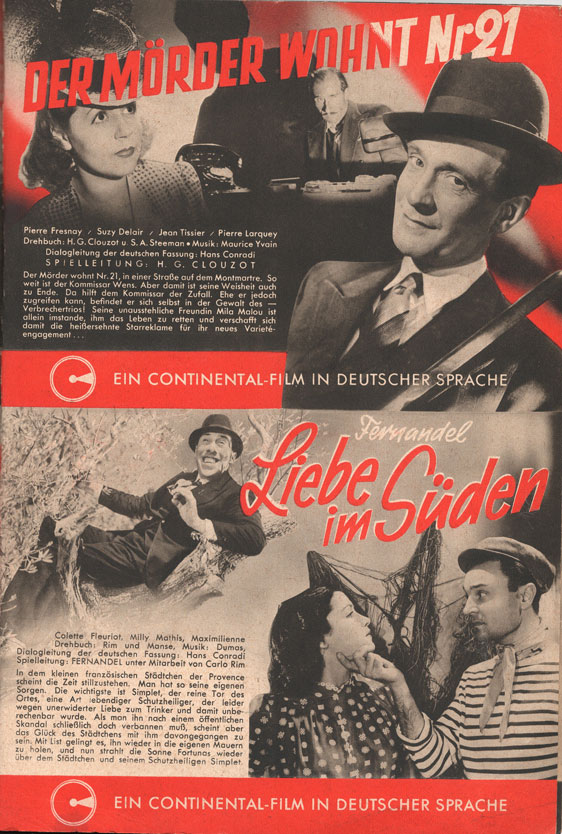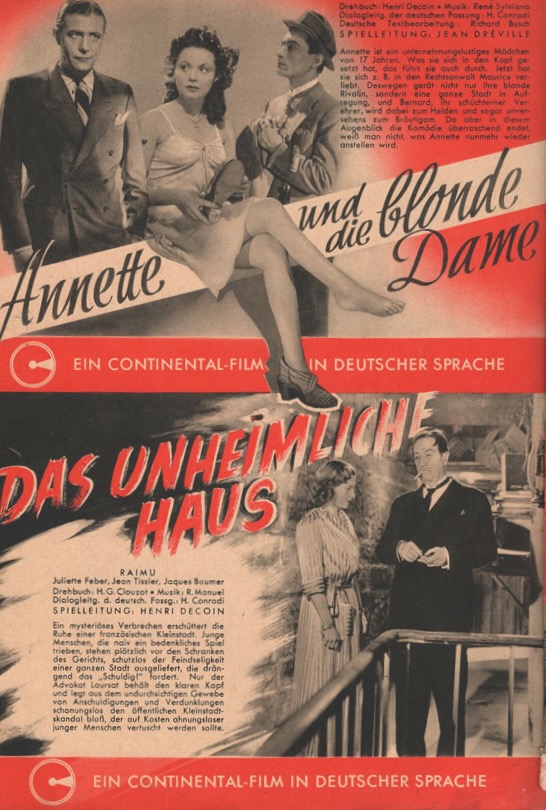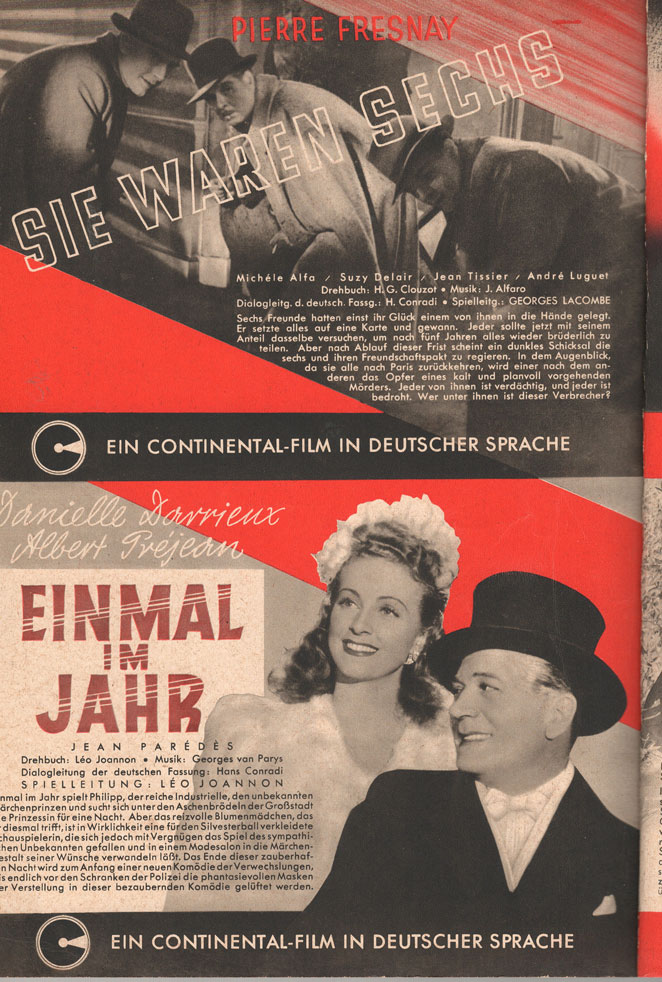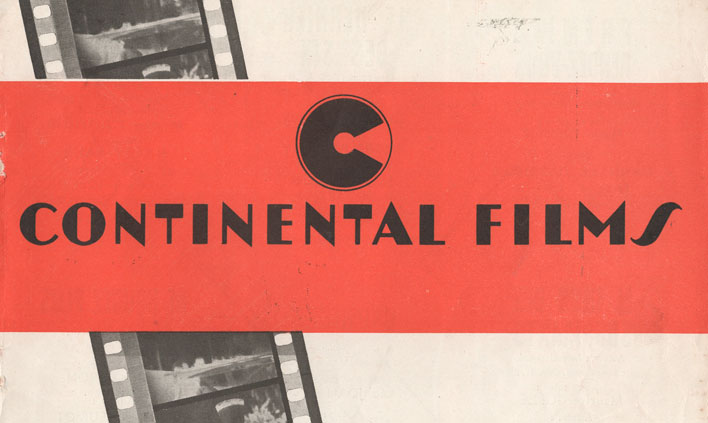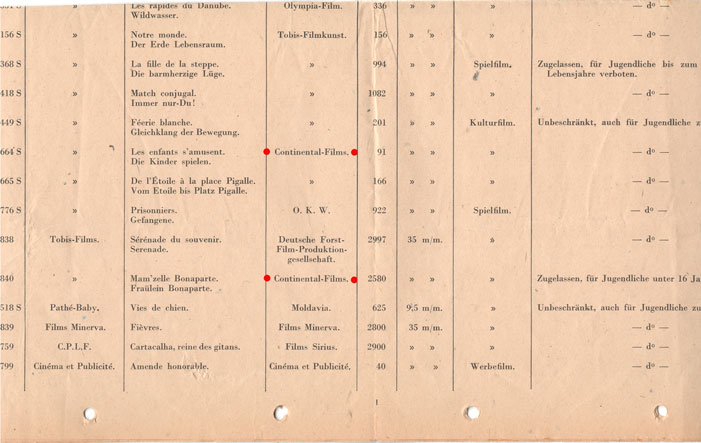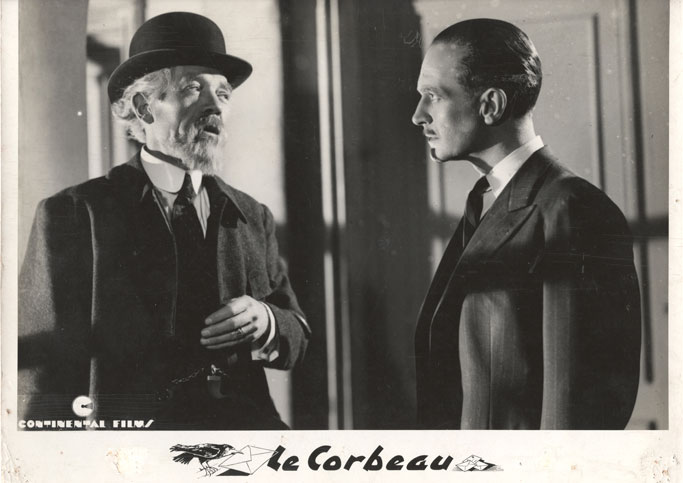- Home
- POSTER GALLERY
- ❗️BOOK & POSTER STORE❗️
- About the Posters
- The William Gillespie Collection
- Our Publishing House
- ❗️GFDN interviews author and collector William Gillespie ❗️
- Our most expensive & inexpensive finds!
- ❗️***NEW!*** Poster of the Month ❗️
- ❗️NEW ❗️Film Posters – Demands on an important means of film advertising. ❗️
- In our Book + Zeitschrift Library
- ❗️ ***NEW!*** Hitler Youth Quex – A Guide for the English–speaking Reader ***NEW!*** ❗️
- ❗️***NEW!*** Table of Contents of our new HJ QUEX book❗️
- ❗️Hitler Youth Quex Guide - early praise! ❗️
- Recent loans from the Collection
- Farewell Horst Claus. (1940–2024)
- "Der Deutsche Film" Zeitschrift
- ❗️ ***NEW!***German "Tendency" Films (Tendenzfilme) in the Third Reich ❗️
- KARL RITTER
- Karl Ritter original film posers in this Collection
- "Besatzung Dora" ( † 1943)
- "The Making of The Crew of the Dora"
- Karl Ritter at the 1938 Reichsfilmkammer Congress
- INDEX -"Karl Ritter" book, 2nd edition
- Karl Ritter's Legion Condor (1939, unfinished)
- Excerpt from our "Dora" book
- ∆∆∆∆∆ High praise for our DORA book! ∆∆∆∆∆
- TABLE OF CONTENTS – "Legion Condor"
- § § § § § Early Praise for our LEGION CONDOR book! § § § § §
- ❗️"Das Leben geht weiter" and Karl Ritter ❗️
- Zarah Leander Europe–wide !
- Japan Military Film and Karl Ritter
- Karl Ritter after 1945
- 1935 Film Congress
- Poster Exhibition in Berlin, March 1939
- Potsdam poster exhibition 12 April–25 August 2019
- Leni Riefenstahl's two "Olympia" Films (1938)
- "Ohm Krüger" (1941)
- Emil Jannings
- "Blutendes Deutschland" (1933)
- Hannes Stelzer ( † 1944)
- Klaus Detlef Sierck ( † 1944)
- Film stills
- Reich Film Censorship Offices
- ❗️Dateline: Ufa - April 11, 1945 ❗️
- ❗️***NEW!***The Fate of the German Film Industry in May 1945 ❗️
- Film censorship cards
- Film Archives
- Cinema advertising
- School filmstrips
- ❗️UPDATED❗️ Z F O / Ostland Film G-m-b-H
- Z F O / Herbert Jacobi estate
- ZFO / Ostland Film newspaper articles
- ❗️***NEW!*** Roter Nebel / Red Fog / Red Mist (1942/1943, ZFO) ❗️
- ZFO - Der Rückkehrer - The Returnee (1943/1944)
- The D F G production company
- D I F U
- ❗️ ***NEW!*** "Carl Peters" – Special Collection. ❗️
- "Alcazar" (1940, Genina)
- "Der 5. Juni" (1943, banned)
- ❗️ ***NEW!*** Herbert Selpin and his "Titanic" (1943) ❗️
- ❗️ ***NEW!*** Ein Robinson (1940, Fanck) ❗️
- "Fronttheater" (1942)
- Veit Harlan's Jud Süß and Fritz Hippler's Der Ewige Jude
- Harlan "Jud Süß" trial 1949
- Werner Krauss & JUD SÜß
- Anti-Semitic Film Posters in the Collection
- "Heimkehr" (1941)
- "Hitlerjunge Quex" (1933)
- ❗️***NEW!*** Hitlerjunge Quex in 111 Greater Berlin Cinemas ❗️
- Jürgen Ohlsen
- "S.A.Mann Brand" (1933)
- "In der roten Hölle" (Edgar Neville, 1939)
- "Helden in Spanien" (1938)
- The Spanish Civil War in Film
- Andrews Engelmann (1901 – 1992)
- Deutsche Wochenschau
- Uƒa Feldpost
- Uƒa Kulturfilm – Informationen
- " Die Tochter des Samurai" (1937, Fanck)
- Ufa 25th Anniversary
- Invitations to world premieres
- ❗️***NEW!*** Continental Films, Paris 1940–1944 ❗️
- Film Censorship in Occupied Paris 1942
- "Der Sieg des Glaubens" (1933)
- Wilhelm Althaus Estate
- Weimar Germany posters
- Ufa and the Ordensburgen
- The Gaufilmstelle in our Collection
- "Zwei Welten" (1940)
- "Capriccio" (1938) –Karl Ritter film album
- Unrealised NS Propaganda Films 1934–1945
- German Film Directors accused of "war crimes"
- Australian––themed NS feature films
- "Der Störenfried" / "The Troublemaker"
- What was new in 2014?
- What was new in 2015?
- What was new in 2016?
- What was new in 2017?
- What was new in 2018?
- What was new in 2019?
- What was new in 2020?
- What was new in 2021?
- What was new in 2022?
- What was new in 2023 ?
- What's new in 2024?
- ❗️***NEW!*** Hitler assassination attempt in Karl Ritter film cut❗️
- BESATZUNG DORA private photos
- Just discovered 1942 article on BESATZUNG DORA
- The Karl Ritter Tetralogy
- Google Analytics 2023
- Our first–ever acquisition!
- ❤️"Some of our favourite things....!"❤️
- ERRATUM for our " Hitler Youth Quex Guide"
- Trending
- Vale †
- Our Wants List / 2024 / Wunschliste
- Pop Quiz
- Unsere KARL RITTER Bücher in Deutschland liefbar!
- WHERE to buy our books right now?
- ✉️Contact
 “History is not about the facts. It is about the context and who is telling the story.” —Prof. Milton Fine.
“History is not about the facts. It is about the context and who is telling the story.” —Prof. Milton Fine.
"Who controls the past controls the future: who controls the present controls the past." –– George Orwell in his novel "1984."
"Whoever doubts the exclusive guilt of Germany for the Second World War destroys the foundation of post–war politics." –– Prof. Theodor Eschenberg, Rector, the University of Tübingen.
"If we have our own why in life, we shall get along with almost any how." – Friedrich Nietzsche
POSTER GALLERY --view
over 500 German film
original posters between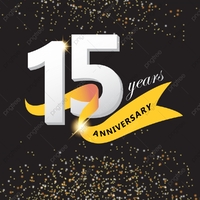
1927–1954 from
Germany and from
many Axis and Neutral countries
across Europe!
Note! Posters in the Poster Gallery are PERMANENT
acquisitions which are NOT FOR SALE!! ONLY the
posters listed in our POSTER STORE are for sale.
(They have a price and order button to use.)
During the German occupation of Paris between 1941 and 1944, it was the policy of the German Reich through Dr. Goebbels to try to pacify the  French population using French language feature films written by French scriptwriters, directed by Frenchmen, and starring French actors. This was accomplished by the establishment of Continental Films in 1940, led and overseen by the experienced German film executive Alfred Greven (shown at left.) He had worked at both the Ufa and Terra Filmkunst studios for years, producing such films as Die alte und junge König, Stadt Anatol, and In Namen des Volkes. Greven worked behind–the–scenes and seemed to stay out of the public spotlight most of the time. For instance, in over 1,000 daily issues of the Berlin Film–Kurier Tageszeitung published between January 1940 and December 1942 his name does not appear in the published Index to that trade newspaper. Neither does the name 'Continental Films.' In a 1997 ZDF TV documentary Tarnname Continental – Alfred Greven, ein deutscher Filmproduzent in Paris, it is stated that shortly before his death in 1973, he burned all his files and personal papers.
French population using French language feature films written by French scriptwriters, directed by Frenchmen, and starring French actors. This was accomplished by the establishment of Continental Films in 1940, led and overseen by the experienced German film executive Alfred Greven (shown at left.) He had worked at both the Ufa and Terra Filmkunst studios for years, producing such films as Die alte und junge König, Stadt Anatol, and In Namen des Volkes. Greven worked behind–the–scenes and seemed to stay out of the public spotlight most of the time. For instance, in over 1,000 daily issues of the Berlin Film–Kurier Tageszeitung published between January 1940 and December 1942 his name does not appear in the published Index to that trade newspaper. Neither does the name 'Continental Films.' In a 1997 ZDF TV documentary Tarnname Continental – Alfred Greven, ein deutscher Filmproduzent in Paris, it is stated that shortly before his death in 1973, he burned all his files and personal papers.
All proposed films were to be of course vetted by German authorities such as Greven and the Propaganda Ministry Abteilung in Paris. Many scripts were rejected and/or altered along the way. Below, from our Reichsfilmkammer Foreign Sales Office files, an internal chart listing all films censored and/or approved or banned by the Paris Propaganda Office in Paris for the period of the 8th to the 20th of January, 1940. Two films produced by Continental Films were approved. Many other films, both feature films and shorter cultural films were not. All listed US and British studio feature films were banned (not shown in the image).

Before the company was wound up with the arrival of the Allies in 1944, Continental Films produced thirty feature films. Some of them were also shown in the Reich in synchronised (dubbed) versions –– see the bottom of this webpage.
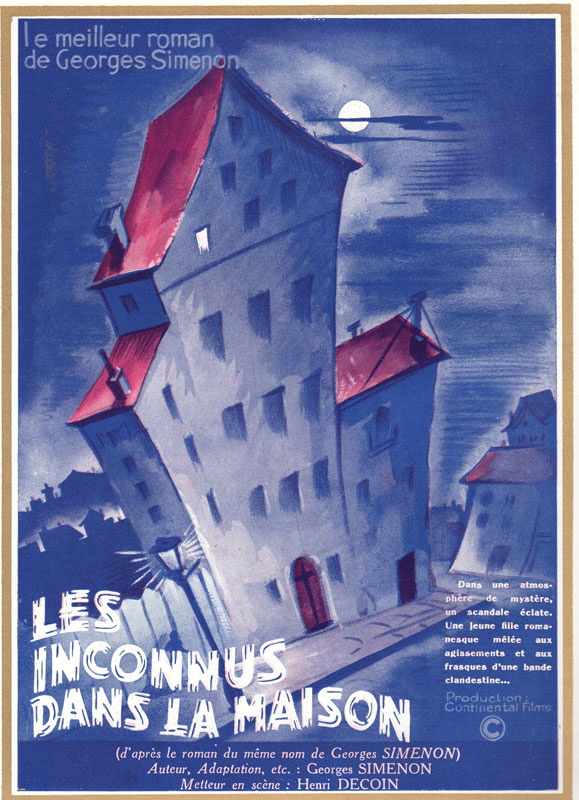
Although the strong point of this Collection was and remains German films, we have some original annual film publicity catalogues and documents in our Collection of the L'Alliance Cinématographique Européenne (ACE) and Continental Films.
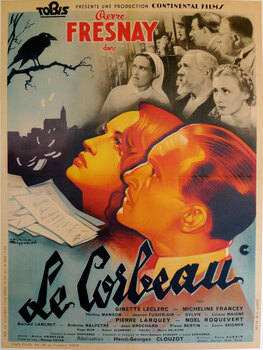 We have a few original Continental Films film posters, the most famous being that of Le Corbeau. Letterboxd stated that this film was 'one of the Most Discussed Films in the History of French Cinema!' and Studiocanal called it 'a veritable masterpiece of French cinema.' Le Corbeau was admired by Hitchcock and Welles and many other film directors and film historians. The Criterion Collection, which is very precise about films they choose, released their own remastered print on DVD with printed booklet.
We have a few original Continental Films film posters, the most famous being that of Le Corbeau. Letterboxd stated that this film was 'one of the Most Discussed Films in the History of French Cinema!' and Studiocanal called it 'a veritable masterpiece of French cinema.' Le Corbeau was admired by Hitchcock and Welles and many other film directors and film historians. The Criterion Collection, which is very precise about films they choose, released their own remastered print on DVD with printed booklet.
We also have ACE press-books for Harlan’s Jud Süß (Le Juif Suss), for Liebeneiner’s Ich klage an, for Steinhoff’s Rembrandt and Ohm Krüger, and for Hebert Selpin’s Titanic. Titanic was given its world premiere in occupied Paris after it had been banned in Germany itself. We also have all of the French ACE press–books of Zarah Leander's films shown in France, and the French poster of her Die große Liebe propaganda film.
In terms of documents, we have an annual publication of the Propaganda Abteilung in Paris from 1942, and several original documents from the Reichsfilmkammer on French film production dated 1939 to 1941. These include:
-
A 3–page carbon copy letter from Dr. Max Winkler’s office dated 24 Mai 1938, outlining German film premiere cinemas in Paris written to the film studios of Tobis, Terra, and Bavaria Films.
-
A Reichsfilmkammer original cover letter dated 10 Juli 1939 and an 11–page mimeographed attachment of the 'Protocol of German–French Film Negotiations' between the French government and the German government officials.
-
A 6–page mimeographed internal Reichfilmkammer Fachgruppe Filmaußenhandel “Mitgliedrundschreiben” dated 11 Juli 1939 on Deutsch–Französisches Filmaustauschadkommen. (i.e.German-French Film Exchange Association). The cover letter reads:
Gentlemen! We send in the attachment 1) Copy of the minutes of the meeting in June this year. German-French film negotiations held in Paris, 2) Text of the agreement now signed by the ambassadors, 3) Copy of the French decree in force for the year 1939/40 about the import and screening of German films in France, 4) For the strictly confidential information of the members of the specialist committee, the exchange of letters between the German Ambassador in Paris and the French Minister of Foreign Affairs, Paris, on the allocation of the synchronization quotas and the final regulation for the payments still due to French filmmakers, 5) Circular to member companies. We have the members of the foreign film trade specialist group the wording of the agreement (Section 2) with which is attached as Annex 5). Circular sent. Heil Hitler! Reich Film Chamber, foreign film trade specialist group.
Of course, these 1938 and 1939 documents outlining German policies regarding French-German Film export plans and governmental agreements were written and negotiated before the outbreak of war in September 1939 and the subsequent German occupation of France. The July 1939 documents however reveal the Reichsfilmkammer's attitude and desire to manage film distribution in France only two months before the war.
-
Finally, we have a 5–page mimeographed internal document of the Reichsfilmkammer dated 24 January 1941 called 'Guidelines for the Export of French Films' outlining the strategy for the distribution of Continental Films across Europe and to the scattered French colonies. We are unaware this this document has ever been cited in any books in French, German or English on either French film during the Occupation, nor in the first-ever books on Continental Films published in the past few years.
We publish this particular document below:
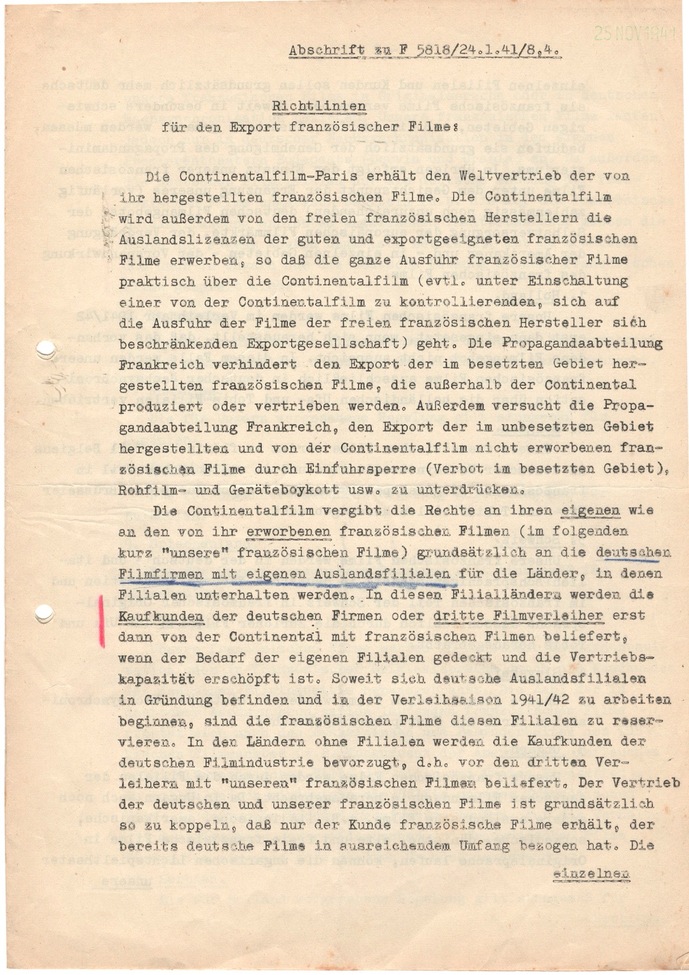
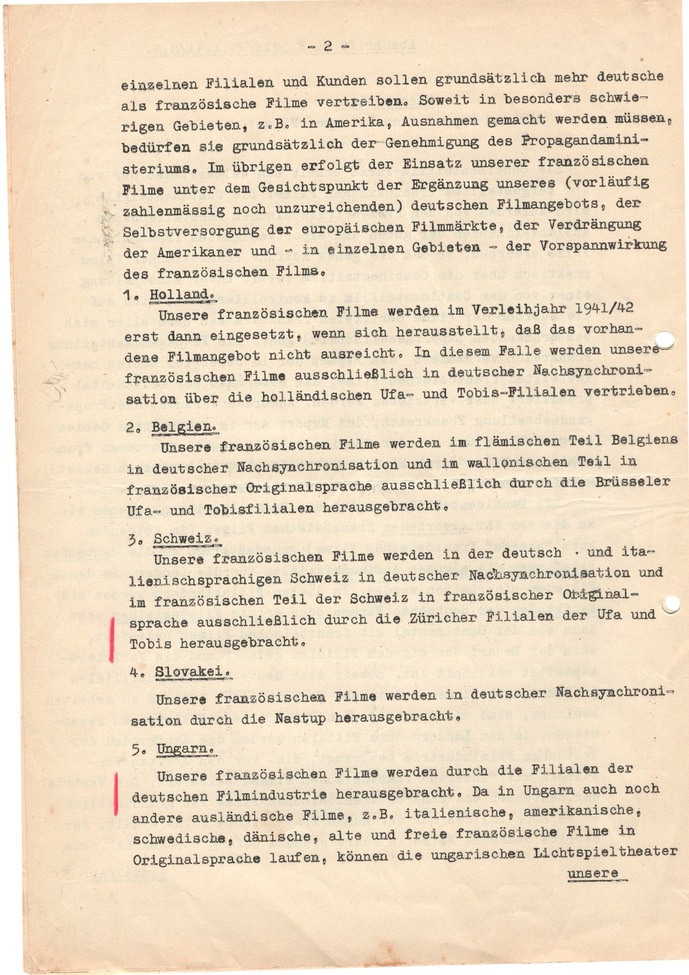
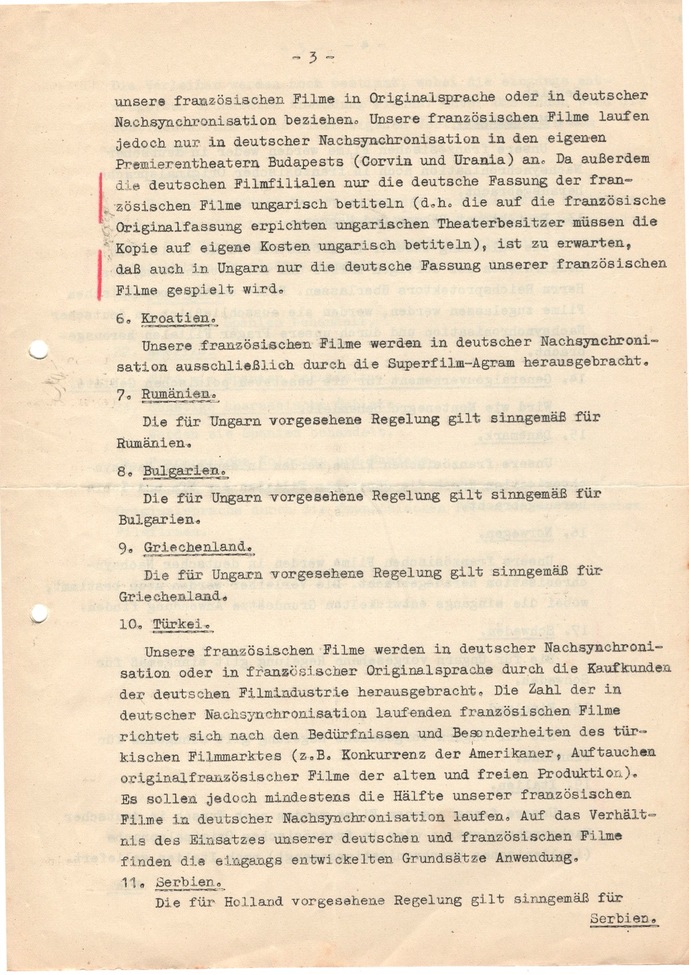
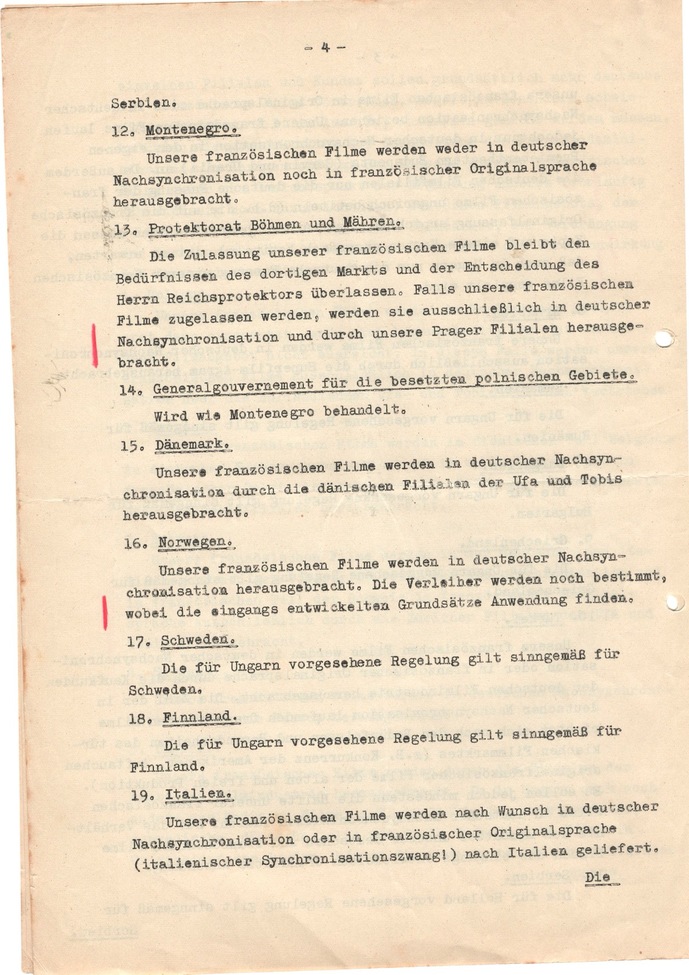
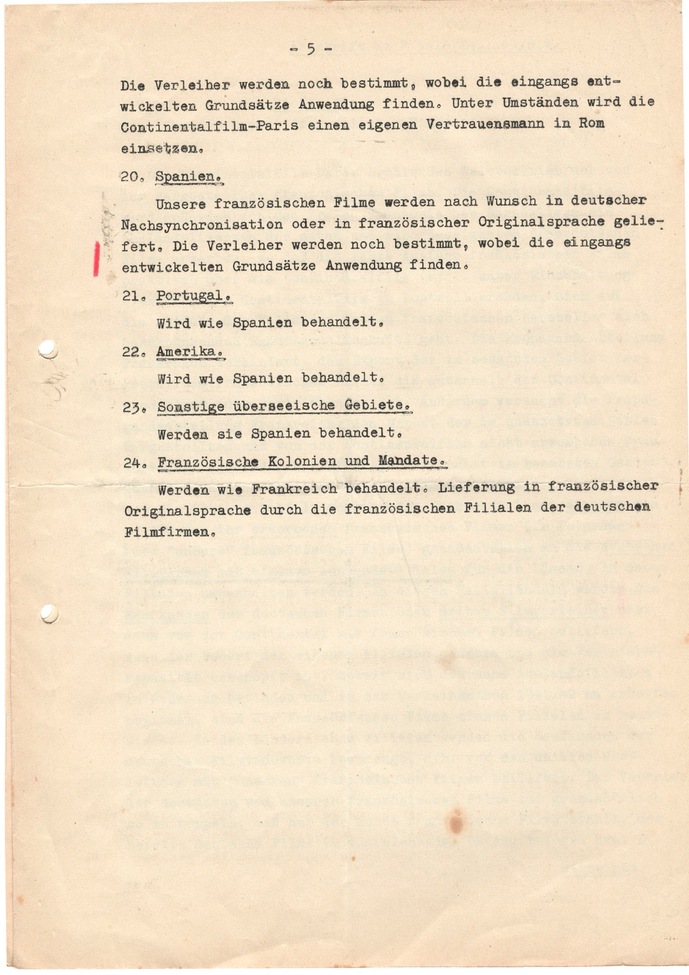
Our Collection also has the 1942 two–ring binder of the Reichsfilmarchiv with an information sheet on each foreign film added to the Archive that year. There are a number of Continental Film sheets in the binder. We show below a scan for the entry for Henri Decoin's Le Premiere Rendezvous.
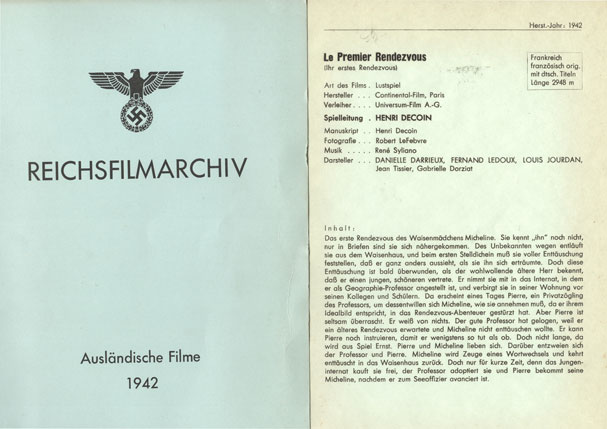
The film was released in the Third Reich as Ihr erstes Rendezvous with synchonised German soundtrack (dubbing). This German dubbed version has been released on DVD by Filmclub Edition, which has a few other well-known Continental films also available on DVD in their German versions. The DVDs are available via Amazon.com. Original French versions of Continental Films on DVD are to be found on Amazon.fr . Some of these films are in box sets devoted to specific French film directors which include other titles not produced in the Occupation.
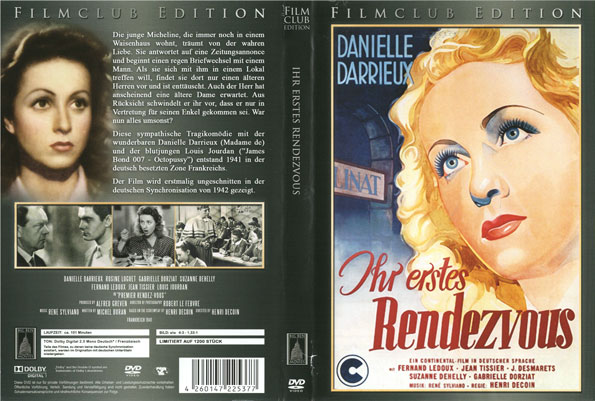
German dubbed versions of Continental Film movies were shown in the Third Reich. In the 1942/1943 season, the four Continental films that year ranked in the top 100 box office titles, attracting from 16.5 million down to 3.5 million paid attendances. Ihr erstes Rendezvous (above) was ranked #20 with the 16.,5 million viewers. Below are three 1942/43 cinema owners' preview catalogue pages on six such Continental Films dubbed releases:
